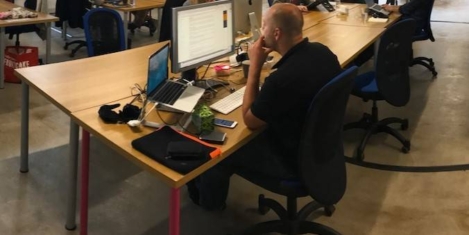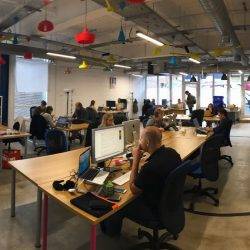January 25, 2018
Two fifths of people think their jobs will be obsolete within a decade
 A new survey from job site Jobbio claims that more than two fifths of British workers think their job will be obsolete in as little as ten years, compared to over a third of those in the US. Respondents believe roles such as travel agents, telemarketers and factory workers will all disappear. in the longer term, a little over two-fifths of 2,000 British respondents (41 percent) think that they won’t be able to retire until the ages of 70-74 in 2050 with less than a fifth (14 percent) thinking they will get to retire under the age of 65. The survey focuses on the issue of happiness and what makes people happy at work. It found that there are some marked differences between the two countries although people are universally keen to address the issue of work life balance.
A new survey from job site Jobbio claims that more than two fifths of British workers think their job will be obsolete in as little as ten years, compared to over a third of those in the US. Respondents believe roles such as travel agents, telemarketers and factory workers will all disappear. in the longer term, a little over two-fifths of 2,000 British respondents (41 percent) think that they won’t be able to retire until the ages of 70-74 in 2050 with less than a fifth (14 percent) thinking they will get to retire under the age of 65. The survey focuses on the issue of happiness and what makes people happy at work. It found that there are some marked differences between the two countries although people are universally keen to address the issue of work life balance.












 Just over half (51 percent) of firms across the UK will grow their workforce in the year ahead, with confidence highest amongst small and mid-sized firms (58 percent) according to the latest CBI/Pertemps Network Group Employment Trends Survey. But the survey warns that delivering further jobs growth depends on businesses being confident they can remain competitive if they choose to base staff in the UK. Nearly two thirds (63 percent) currently believe that changes in the UK labour market will contribute to Britain becoming a less attractive place to invest and do business over the next five years – up from 50 percent last year and 25 percent in 2015. Skills gaps were the single most prominent worry facing firms, with nearly four in five (79 percent) respondents highlighting this as a worry – up from 64 percent in 2016. Access to overseas workers is a big contributor to this, with nearly half of respondents (49 percent) identifying uncertain access to labour supply – up from 35 percent in 2016 as a concern.
Just over half (51 percent) of firms across the UK will grow their workforce in the year ahead, with confidence highest amongst small and mid-sized firms (58 percent) according to the latest CBI/Pertemps Network Group Employment Trends Survey. But the survey warns that delivering further jobs growth depends on businesses being confident they can remain competitive if they choose to base staff in the UK. Nearly two thirds (63 percent) currently believe that changes in the UK labour market will contribute to Britain becoming a less attractive place to invest and do business over the next five years – up from 50 percent last year and 25 percent in 2015. Skills gaps were the single most prominent worry facing firms, with nearly four in five (79 percent) respondents highlighting this as a worry – up from 64 percent in 2016. Access to overseas workers is a big contributor to this, with nearly half of respondents (49 percent) identifying uncertain access to labour supply – up from 35 percent in 2016 as a concern.





















January 11, 2018
Culture shift needed to drive a better gender balance in property and construction
by Niki Fuchs • Comment, Property
More →